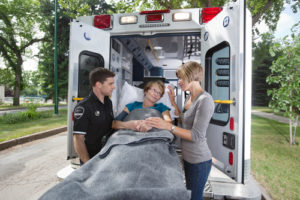
Dual-eligible Medicare and Medicaid patients would gain access to non-emergency medical transportation (NEMT) under a bipartisan bill sponsored on Sept. 15 by U.S. Rep. Buddy Carter (R-GA).
Currently, Medicare beneficiaries must obtain prior authorization before accessing ambulance rides to dialysis or diabetes wound care services, threatening their access to regularly scheduled, critical healthcare services, according to Rep. Carter’s office.
“This is a common-sense move that will increase patients’ access to health care, particularly for elderly, low-income, and diabetic patients,” said Rep. Carter, who introduced the Access to Critical Non-Emergency Transportation Services Act, H.R. 8841, with two Democratic cosponsors, including lead cosponsor U.S. Rep. Tony Cárdenas (D-CA).
If enacted, H.R. 8841 would require the U.S. Secretary of Health and Human Services to coordinate with states to ensure low-income Medicare patients dually enrolled in Medicaid and Medicare who are denied ambulance NEMT are able to access Medicaid NEMT with appropriate modes of transportation, according to the text of the bill.
H.R. 8841 also would ensure Medicare beneficiaries who qualify as partial dual-eligible beneficiaries are given assistance to enroll in Medicaid and have access to Medicaid transportation benefits, the bill says.
“This bipartisan bill will ease the burden of transportation for the most vulnerable Americans nationwide,” said Rep. Carter. “Unnecessary bureaucracy should never be a barrier to high-quality medical care.”
“Part of our job as members of Congress is to ensure that no one is harmed by unintended negative consequences from legislation, and that’s what we’ve done with the Access to Critical Non-Emergency Transportation Services Act,” added Rep. Cárdenas.
Specifically, H.R. 8841 would adjust the Repetitive, Scheduled, Non-Emergent Ambulance Transport (RSNAT) model originally developed by the Centers for Medicare & Medicaid Services’ Centers for Program Integrity and for Medicare and Medicaid Innovation that uses prior authorization to ensure the appropriate use of ambulance services in Medicare.
The RSNAT, for which a nationwide expansion was completed this summer, needs to be tweaked because upon evaluation showed that nearly half of the beneficiaries who lose their ambulance service are disproportionately low-income, frail, disabled, and elderly, according to information provided by Rep. Carter’s staff.



